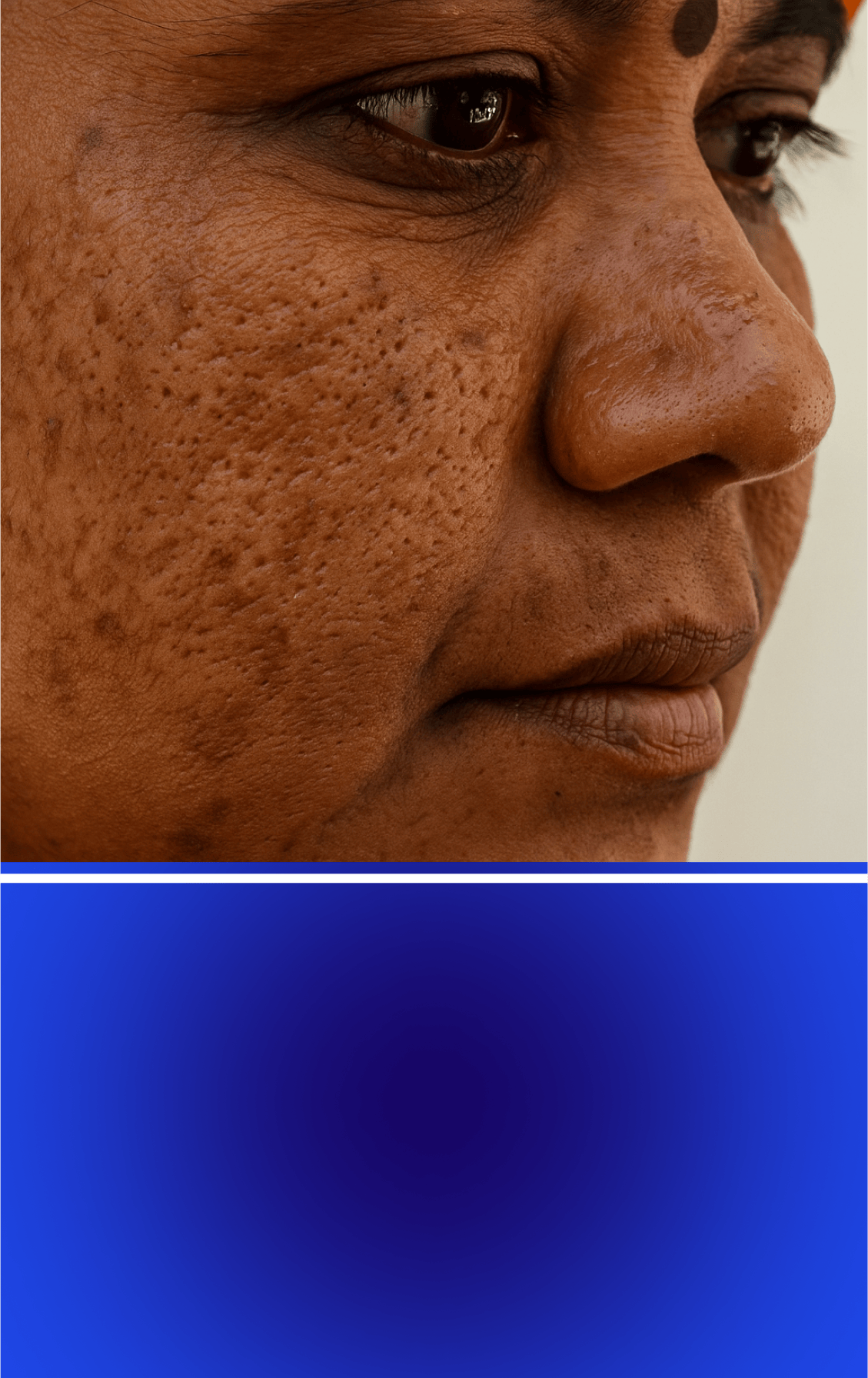Chennai's tropical climate, high humidity, and constant sun exposure do more than just cause discomfort. They speed up the skin's ageing process by breaking down collagen and weakening the skin's natural barrier. This often leads to the early appearance of wrinkles and fine lines, especially when sun protection and hydration are not part of a daily routine.
Facial ageing is a natural biological process. However, in Chennai's weather conditions, these changes often become apparent earlier and more noticeably. Research published in the Journal of Physiological Anthropology shows that wrinkles are closely linked to our perceived age, which is why many people feel concerned when they notice lines forming.
If you're frustrated by visible skin changes or confused by the flood of skincare advice online, this guide offers clarity with medically backed treatments for facial wrinkles. From lasers and injectables to medical-grade skincare, each solution is based on clinical expertise and works best under the care of certified dermatologists, ensuring safe, effective results tailored to your skin type and lifestyle.
Overview
- Wrinkle Formation: Wrinkles form due to repetitive muscle movements (dynamic wrinkles), ageing, gravity, and loss of skin collagen and elastin (static wrinkles), with sun exposure, smoking, and genetics accelerating the process.
- Prevention Strategies: The most effective ways to prevent wrinkles and preserve skin elasticity and collagen are the daily use of broad-spectrum sunscreen, protective clothing, and avoidance of UV exposure.
- Professional treatments, including prescription retinoids, chemical peels, and laser therapy, administered by dermatologists, provide highly effective wrinkle reduction tailored to individual skin needs.
- Injectable and Non-Invasive Options: Dermal fillers, such as hyaluronic acid, instantly smooth static wrinkles, while non-invasive radiofrequency treatments tighten the skin for a youthful appearance.
- Supporting Skin Health: Medical-grade skincare, featuring hyaluronic acid, peptides, and antioxidants, combined with a healthy diet, adequate sleep, and effective stress management, enhances treatment outcomes and promotes long-term skin vitality.
Understanding Facial Wrinkles: The Science Behind Ageing
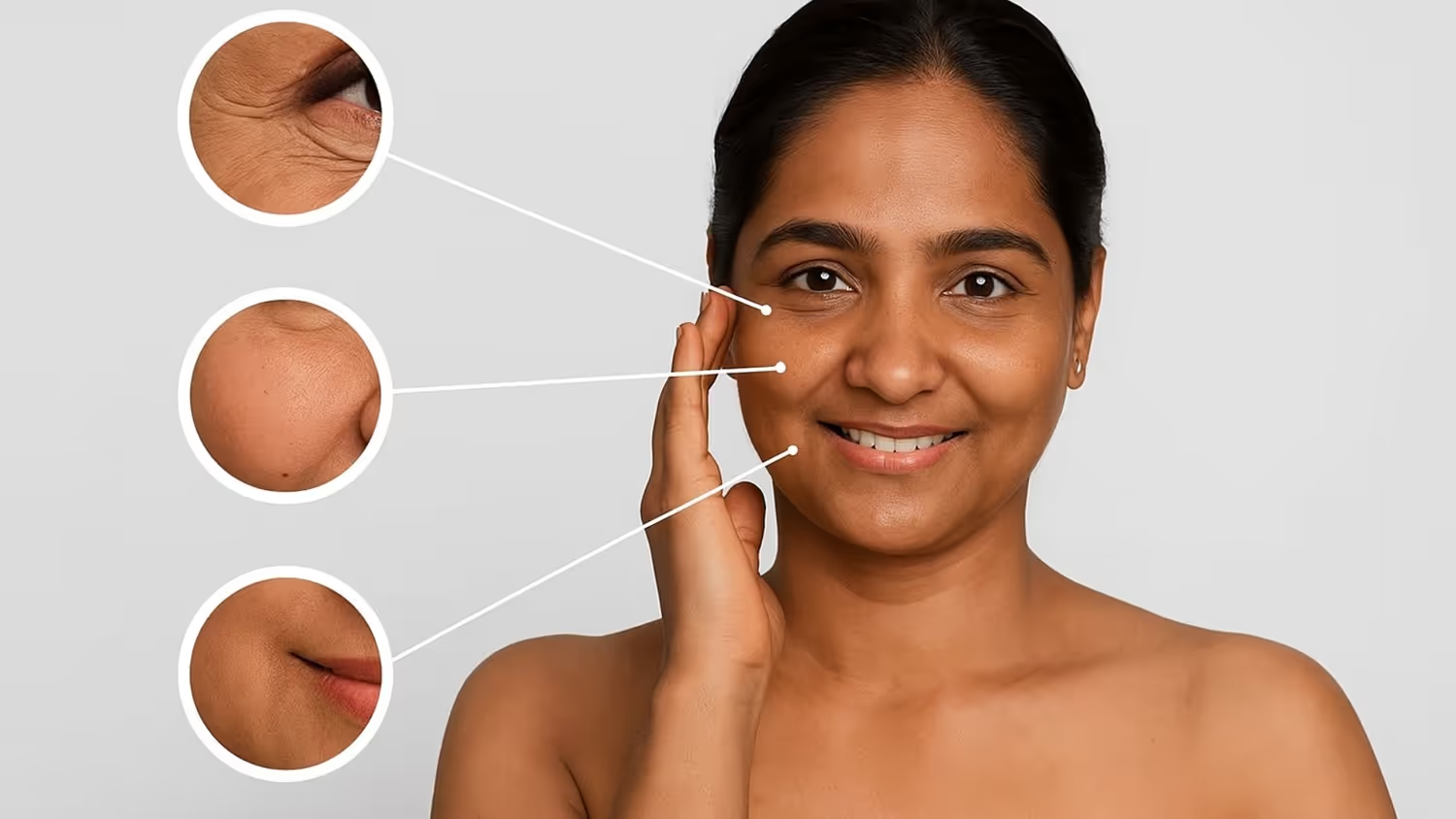
Before exploring treatment options, it's crucial to understand why wrinkles develop and how different types react to various interventions. This knowledge helps set realistic expectations and guides treatment choices for the best results.
What Causes Wrinkles to Form?
Facial wrinkles develop through a complex interplay of internal and external factors that work together to break down your skin's natural support structure:
- Collagen decline: Natural ageing decreases collagen production by approximately 1% annually, starting in our mid-twenties.
- UV damage acceleration: Sun exposure breaks down existing collagen fibres and hinders new formation.
- Repetitive expressions: Muscle contractions from smiling, frowning, or squinting can create temporary lines that, over time, may become permanent.
- Environmental factors: Harsh tropical climates with intense UV radiation accelerate the ageing process all year round.
The intrinsic ageing process cannot be stopped entirely, but understanding these factors helps in developing effective prevention and treatment strategies.
Types of Wrinkles: Dynamic vs Static
Understanding the different types of wrinkles is essential for effectively reducing facial wrinkles. This classification directly guides the choice of the most suitable treatments for your particular concerns.
Dynamic wrinkles, such as crow's feet, forehead lines, and frown lines, appear during facial expressions like smiling or frowning but fade when muscles relax. In contrast, static wrinkles, including permanent nasolabial folds and marionette lines, remain visible at rest due to ageing-related loss of skin volume and elasticity.
A professional dermatological assessment is crucial for determining the best treatment approach for each wrinkle type, ensuring effective and personalised care.
Use Retinoids and Prescription Creams
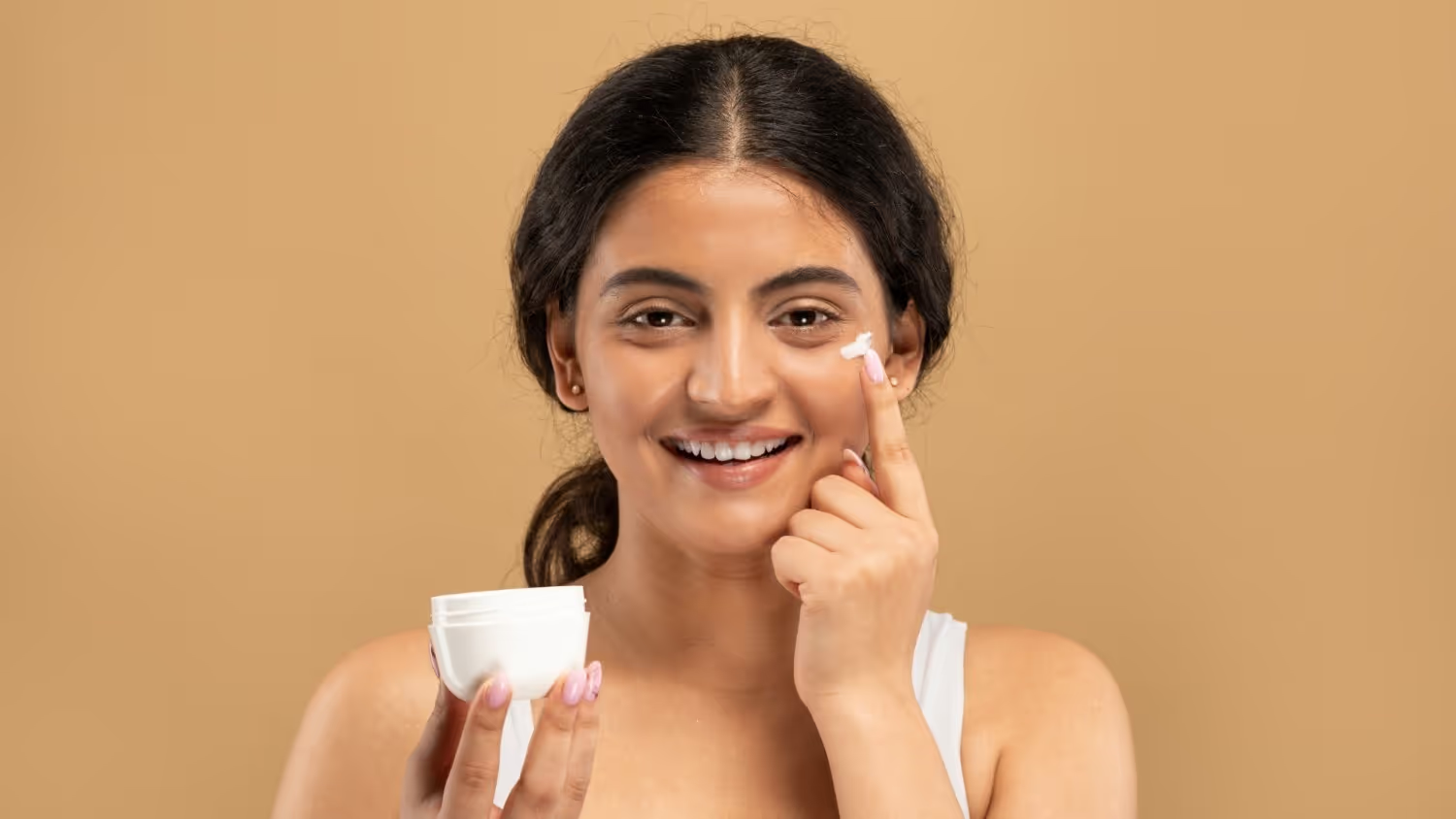
Topical treatments, especially dermatologist-prescribed retinoids, are key to an effective anti-ageing strategy, improving skin texture and reducing wrinkles with proven results.
How Retinoids Work
Retinoids, the gold standard in anti-ageing skincare, are highly effective for reducing wrinkles on the face, as recommended by dermatologists. These vitamin A derivatives accelerate cell turnover, boost collagen production, improve skin texture, and enhance the efficacy of other skincare products, delivering scientifically proven results.
Clinical studies consistently demonstrate that retinoids can reduce fine lines, improve skin texture, and enhance overall skin quality when used consistently under the guidance of a medical professional.
Prescription Options Available in India
Moving beyond over-the-counter options, prescription retinoids offer superior efficacy and controlled delivery systems.
Tretinoin formulations:
- Available in various strengths from 0.025% to 0.1%
- Most extensively studied retinoid with decades of clinical data
- Requires a gradual introduction to minimise irritation
Adapalene options:
- Gentler than tretinoin with reduced irritation potential
- Suitable for sensitive skin types common in Indian populations
- Available in gel and cream formulations
Your dermatologist will determine the appropriate strength and formulation based on your skin type, tolerance level, and specific ageing concerns.
Benefits and Realistic Timeline
Prescription retinoids require patience and consistency to achieve optimal results. Understanding the timeline helps maintain realistic expectations:
- Weeks 0-4: Initial adjustment period with possible mild irritation
- Weeks 4-12: Gradual improvement in skin texture and tone
- Weeks 12-24: Noticeable reduction in fine lines and wrinkles
- Month 6+: Full benefits become apparent with continued use
Sun protection is crucial when using retinoids, as they can increase the skin's sensitivity to UV radiation. Your dermatologist will give you specific instructions for safe and effective use.
Ready to explore prescription anti-ageing treatments? Please schedule a consultation with our experienced dermatologist at Velantis Dermatology to discuss personalised retinoid therapy options tailored to your skin's unique needs.
Moisturise Regularly with Medical-Grade Products
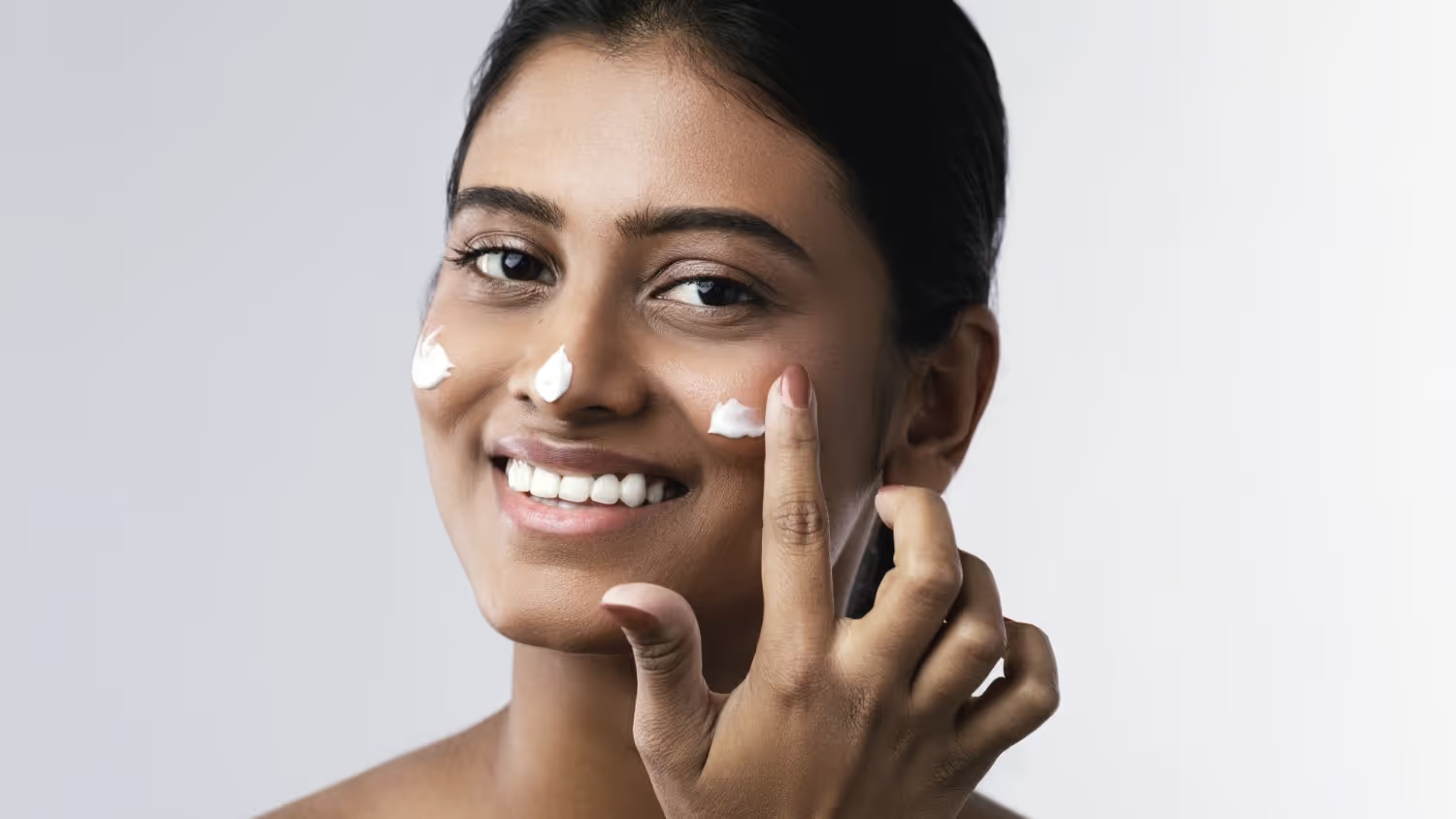
Moisturisation complements retinoids by keeping the skin hydrated and supporting its barrier, thereby enhancing anti-ageing efforts. Dermatologist-recommended medical-grade moisturisers offer superior formulations to strengthen the effectiveness of professional treatments.
The Science Behind Proper Hydration
Proper moisturisation is key to reducing wrinkles on the face, maintaining the skin barrier to prevent moisture loss and protecting against damage. It supports cellular repair, creating ideal conditions for skin healing. Medical-grade moisturisers enhance anti-ageing treatments, ensuring smoother, hydrated skin.
With age, the skin loses moisture more rapidly, exacerbating dryness and the development of wrinkles. Dermatologist-recommended moisturisers, with potent active ingredients, are rigorously tested for safety and efficacy. They effectively complement professional treatments for visible results.
Evidence-Based Ingredients to Look For
The most effective moisturisers include scientifically proven ingredients that target multiple facets of skin ageing.
Hydrating compounds include:
- Hyaluronic acid: Holds up to 1,000 times its weight in water
- Glycerin: Attracts moisture from the environment
- Sodium PCA: Natural moisturising factor that binds water
Barrier repair ingredients include:
- Ceramides: Restore and maintain protective skin barrier
- Cholesterol: Supports barrier function and flexibility
- Fatty acids: Essential for healthy barrier structure
Anti-ageing actives include:
- Niacinamide (Vitamin B3): Reduces inflammation and supports collagen production
- Peptides: Stimulate cellular repair and collagen synthesis
- Antioxidants: Protect against damage caused by free radicals.
- Topical retinoids: Gold-standard molecules for boosting collagen, accelerating cell turnover, and reducing fine lines over time
Clinical Benefits
Medical-grade moisturisers, recommended by dermatologists, reduce fine lines by hydrating and plumping skin while supporting long-term skin barrier function and cellular repair. Tailored for India's humid climate, they provide balanced hydration without oiliness, enhancing the effectiveness of professional anti-ageing treatments.
Professional Chemical Peels: Medical-Grade Solutions
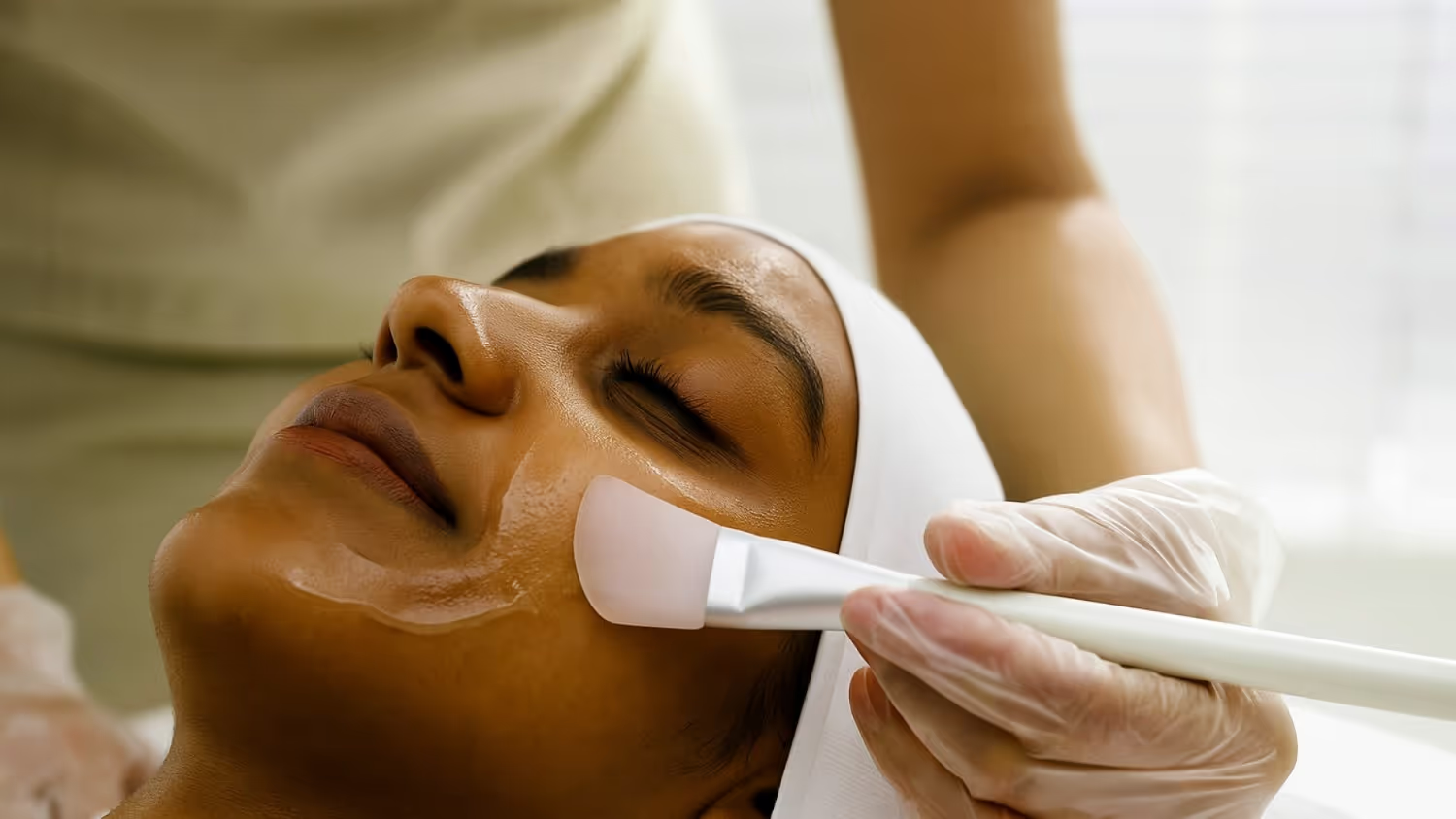
Chemical peels provide controlled exfoliation to tackle wrinkles, surpassing the benefits of home care effectively. These medical procedures, administered by dermatologists, ensure safety and optimal results. Professional assessment is essential for their success.
How Chemical Peels Work
Chemical peels, performed by dermatologists, provide controlled exfoliation to remove damaged skin cells, stimulate collagen and new cell growth, and enhance the effectiveness of other treatments. Using precise acid concentrations and customised depths, they improve skin texture and reduce ageing signs safely, tailored to individual needs.
Types of Peels for Wrinkle Reduction
Understanding the various peel options helps determine the most suitable treatment for your specific concerns. They include superficial peels, medium-depth peels, and deep peels.
Superficial peels (minimal downtime)
- Glycolic acid: Smallest molecule for effective penetration
- Lactic acid: A Gentler option suitable for sensitive skin
- Salicylic acid: Ideal for oily or acne-prone skin types
- Yellow peel / Retinoid peel: Best for pigmentation, early ageing, and dull skin — promotes cell turnover with minimal flaking
Medium-depth peels (moderate recovery)
- TCA (Trichloroacetic acid): More significant wrinkle improvement
- Combination peels: Multiple acids for comprehensive treatment
- Jessner's solution: Effective for sun damage and ageing
Deep peels (extensive recovery)
- Phenol peels: Dramatic results for severe wrinkles
- Requires careful patient selection and extended healing time
- Reserved for specific cases with appropriate medical supervision
Benefits and Recovery Process
Chemical peels, administered by dermatologists, improve skin texture, reduce fine lines, enhance radiance, and boost collagen for lasting results. Superficial peels cause mild redness for 1-2 days, medium peels require 7-14 days of recovery, and deep peels need weeks but offer significant transformation.
Multiple sessions are often necessary for optimal outcomes, with a dermatologist tailoring the treatment schedule to strike a balance between benefits and healing time. Proper aftercare, specific to each peel depth, ensures safe and effective results.
Advanced Microneedling and Collagen Induction Therapy
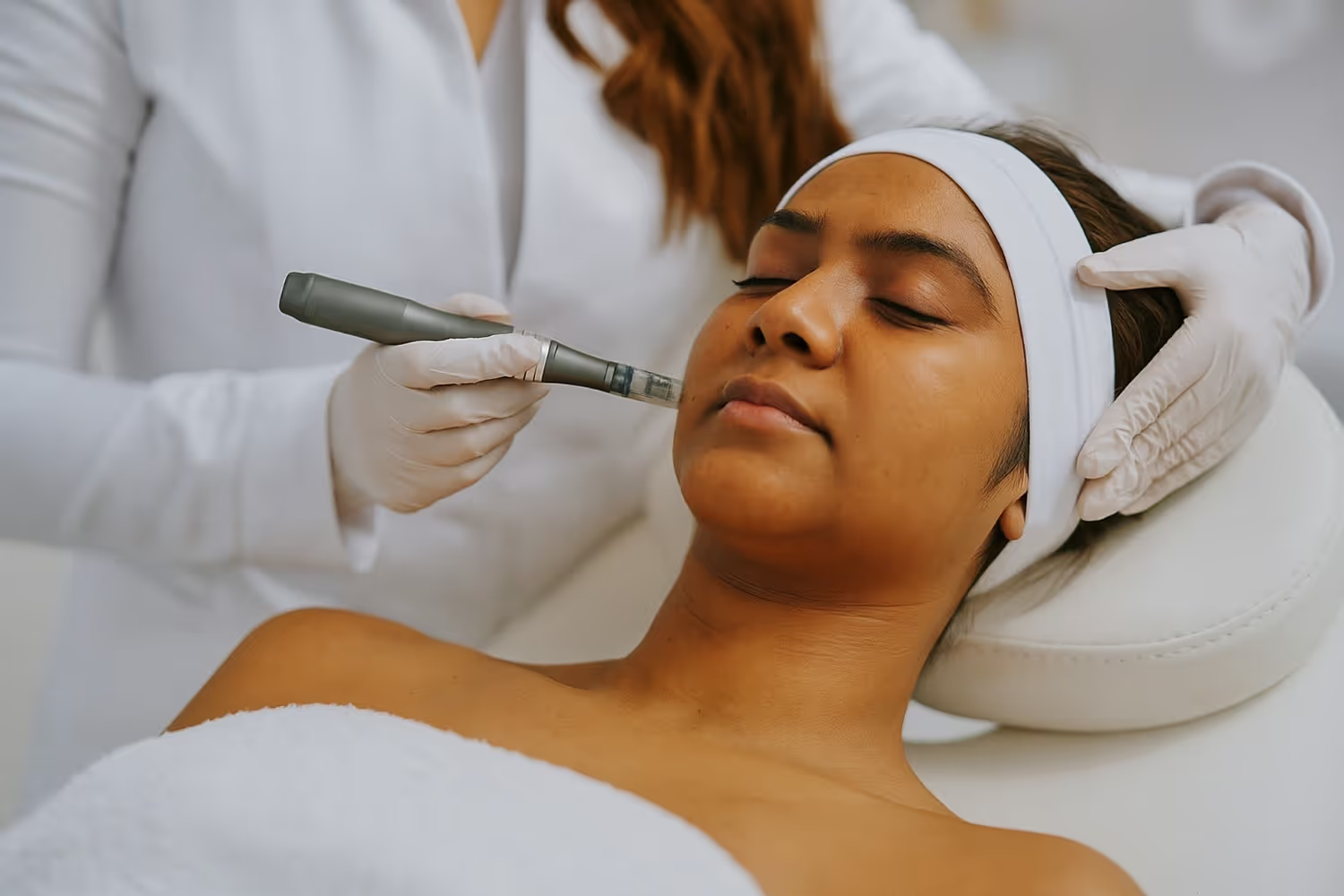
Microneedling, a dermatologist-performed procedure, reduces wrinkles by triggering the body's healing response through controlled micro-injuries. Tailored to different skin types, it complements other treatments for enhanced anti-ageing results.
The Science of Controlled Skin Injury
Microneedling harnesses your body's natural healing mechanisms to improve skin quality. The process involves:
- Micro-injury creation: Precise punctures trigger healing responses
- Collagen stimulation: Natural production of new support proteins
- Growth factor release: Enhanced cellular repair and regeneration
- Improved absorption: Better penetration of topical treatments
Professional microneedling devices use precise needle depths and spacing to achieve optimal results while minimising discomfort and recovery time. The controlled nature ensures consistent penetration and reduces the risk of complications.
Professional vs At-Home Options
Professional microneedling, performed by dermatologists, utilises deeper needle penetration (0.5-3mm) to achieve significant wrinkle reduction, ensuring safety in a sterile environment. It allows customised protocols and combines with specialised serums for optimal results. This precision enhances effectiveness, tailored to individual skin needs.
At-home microneedling devices, which use shorter needles (0.25-0.5mm), offer limited benefits and cannot match the depth or serum integration of professional treatments. They carry risks of improper technique or contamination, making dermatologist-led therapies safer and more effective for reducing wrinkles.
Clinical Outcomes
Microneedling has been widely studied and shown to be effective in addressing multiple signs of ageing. Results typically begin to appear within four to six weeks, with more noticeable improvements in skin texture and firmness by the second or third month. Collagen production continues over time, with enhancements still visible after six months.
For optimal outcomes, most individuals benefit from three to six sessions spaced four to six weeks apart. Maintenance treatments, administered every six to twelve months, help sustain the results. When combined with other dermatological procedures, microneedling can provide even more comprehensive skin rejuvenation.
Microdermabrasion and Dermabrasion: Surface Rejuvenation
Complementing deeper treatments like microneedling, surface rejuvenation techniques provide additional options for targeting specific wrinkle concerns. These mechanical exfoliation methods can be especially effective for particular skin types and ageing patterns.
Understanding the Techniques
Both techniques employ mechanical methods to enhance skin texture by controlled removal of surface layers.
Microdermabrasion process:
- Fine crystals or diamond-tipped devices remove dead skin cells.
- Gentle suction simultaneously clears exfoliated material.
- Causes minimal discomfort and allows immediate return to normal activities.
- Suitable for regular maintenance treatments.
Dermabrasion characteristics:
- A more aggressive procedure using specialised rotating equipment
- Removes deeper layers of damaged skin
- Requires more extended recovery periods with more noticeable results
- Reserved for significant skin damage or scarring
Suitability and Safety Considerations
A dermatologist's professional assessment ensures the proper treatment for reducing wrinkles, taking into account factors such as skin type, sensitivity, the severity of wrinkles, and medical history. Patient expectations and recovery options are evaluated to tailor the approach. This personalised care maximises safety and effectiveness for optimal outcomes.
For Indian skin, dermatologists address the higher risk of post-inflammatory hyperpigmentation by selecting careful techniques and providing climate-appropriate aftercare. Their expertise in diverse skin tones ensures minimal risks and enhanced results, making professional guidance essential for effective wrinkle treatment.
Expected Results and Recovery
Understanding realistic outcomes helps in making informed treatment decisions.
Microdermabrasion expectations include:
- Improved skin texture and reduced surface irregularities
- Minimal downtime with mild redness resolving within hours
- Multiple sessions needed for significant wrinkle improvement
- Excellent maintenance treatment option
Dermabrasion outcomes:
- More dramatic improvement in deeper wrinkles and skin damage
- 1-2 weeks recovery time with controlled healing process
- Significant texture improvement and skin rejuvenation
- Long-lasting results with proper aftercare
Both treatments can be combined with other modalities to create comprehensive skin rejuvenation programmes tailored to individual needs and goals.
Laser and Light Therapy: Advanced Skin Resurfacing
Moving beyond mechanical treatments, laser technology is at the forefront of wrinkle reduction therapy. These advanced devices provide precise, customisable treatments that can effectively target different aspects of facial ageing.
Types of Laser Treatments Available
Modern laser systems provide multiple options for addressing different wrinkle concerns and skin types. They include:
Ablative laser options:
- Fractional CO2 lasers: Induce controlled thermal injury for notable improvement
- Erbium lasers: Remove tissue precisely with minimal thermal damage
- Full-field treatments: A more aggressive approach for extensive damage
Non-ablative alternatives:
- Heat deeper skin layers without surface damage.
- Gradual collagen remodelling over time.
- Minimal downtime with cumulative improvements. Suitable for patients seeking subtle enhancement.
Light-based therapies:
- IPL (Intense Pulsed Light): Targets pigmentation and vascular concerns
- LED therapy: Promotes cellular healing and collagen production
- Combination approaches: Multiple wavelengths for comprehensive treatment
How Laser Technology Works
Laser treatments, guided by dermatologists, utilise selective photothermolysis to target specific skin components with precise wavelengths, stimulating healing through controlled thermal injury. This promotes collagen remodelling and tissue tightening, effectively improving skin structure and firmness for comprehensive wrinkle reduction.
Benefits and Considerations
Laser treatments, performed by skilled dermatologists, use precise, customised settings to effectively improve skin firmness and reduce wrinkles, targeting specific concerns while minimising risks. Tailored to individual skin types, multiple sessions ensure long-lasting results, with expert care delivering safe and optimal outcomes.
Considering advanced laser treatments for wrinkle reduction? Our specialists at Velantis Dermatology utilise state-of-the-art laser technology and have extensive experience treating diverse skin types safely and effectively.
Injectable Treatments and Soft-Tissue Fillers
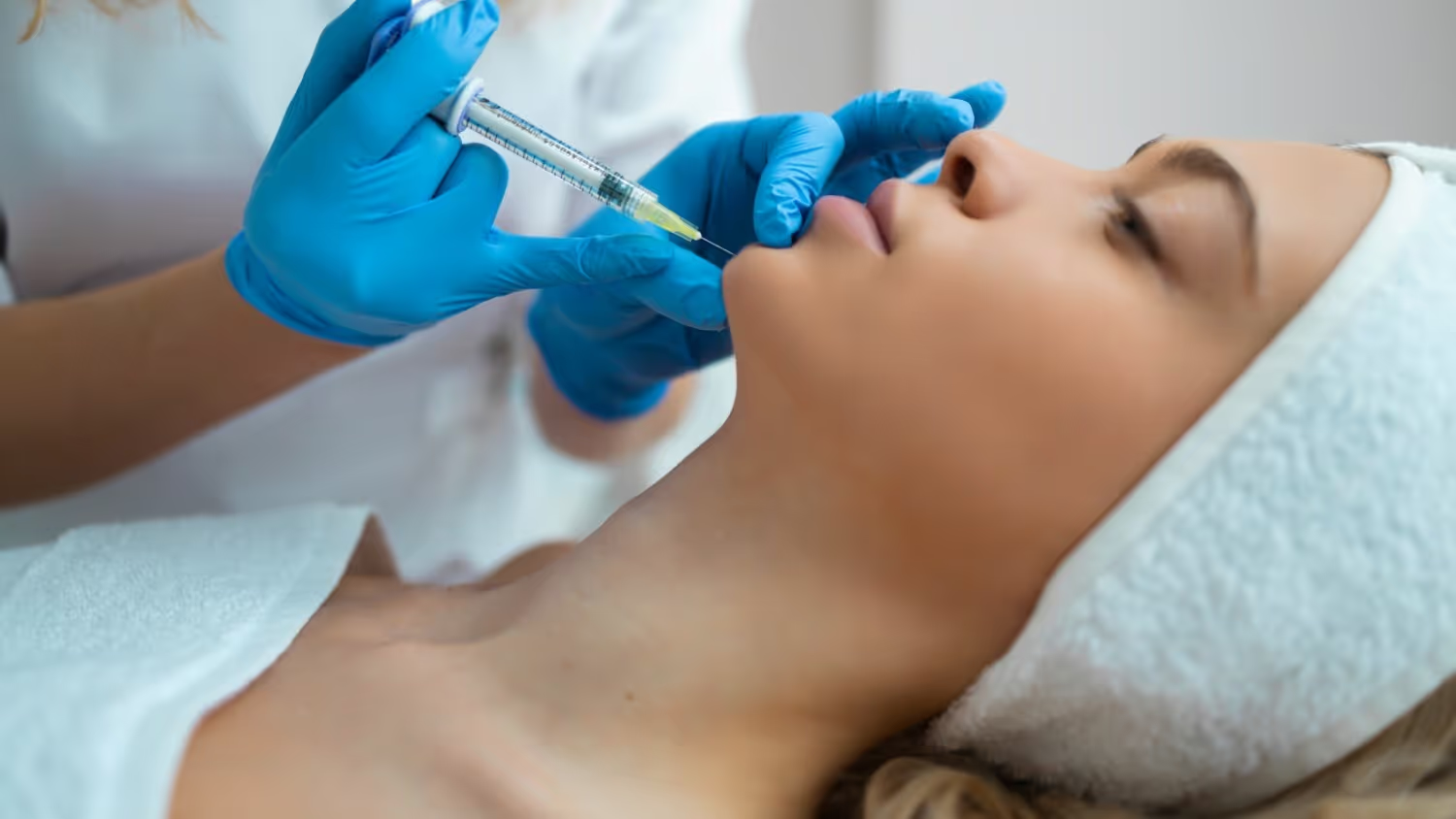
Facial wrinkles are primarily categorised into two types: dynamic wrinkles, caused by repeated muscle movements such as smiling or frowning, and static wrinkles, which result from ageing, gravity, and loss of skin elasticity or volume. Other contributing factors include sun exposure, smoking, and genetics, which accelerate the breakdown of collagen and elastin.
Injectable treatments, administered by qualified dermatologists, provide quick and practical solutions to reduce facial wrinkles with minimal invasiveness. These include:
- Botulinum toxin (Botox): Targets dynamic wrinkles by temporarily relaxing specific facial muscles, like those causing forehead lines, frown lines, and crow’s feet. The result is smoother, more youthful-looking skin with effects lasting 3-6 months.
- Dermal fillers: Primarily hyaluronic acid-based, these restore volume, fill static wrinkles, and provide natural-looking results within minutes. Safe and temporary, they require periodic maintenance for sustained benefits.
FDA-approved fillers, such as Restylane and Juvederm, ensure smooth, predictable outcomes that last 6–18 months, while options like calcium hydroxylapatite stimulate collagen for longer-lasting effects. Careful patient selection and expert technique by dermatologists are crucial for optimal, safe results tailored to individual needs.
Treatment Process and Results
Professional injectable treatments, guided by dermatologists, ensure safe and effective wrinkle reduction through a thorough consultation, including a facial assessment, a review of your medical history, and customised planning. Using precise techniques and topical anaesthesia, these treatments deliver natural-looking results with minimal downtime, which are visible immediately and optimal within 1–2 weeks. Touch-ups are required every 6 to 18 months for sustained benefits.
Discover how FDA-approved dermal fillers at Velantis Dermatology can help you achieve natural, rejuvenated results tailored to your goals.
Ultrasound and Radiofrequency (RF) Therapy
Energy-based therapies, such as ultrasound and radiofrequency, stimulate collagen production and tighten skin by delivering controlled thermal energy to the deeper layers, eliminating the need for surgery. These advanced technologies stimulate natural rejuvenation processes without the need for needles or surgery.
Non-Invasive Skin Tightening Technology
These sophisticated devices harness different energy forms to achieve skin improvement.
- Focused ultrasound: Precise targeting of specific skin depths
- Radiofrequency heating: Controlled thermal stimulation of collagen production
- Non-surgical approach: Significant results without surgical risks or downtime
- Gradual improvement: Natural-looking enhancement over time
The precision of modern devices enables targeted treatment while protecting surrounding healthy tissue. This method offers gradual, natural-looking enhancements without the need for surgical procedures.
Available Treatments
Non-invasive skin tightening treatments, such as Ultherapy and Thermage, performed by dermatologists, utilise FDA-approved ultrasound and radiofrequency to stimulate collagen production and enhance skin firmness. Targeting deeper skin layers, they offer immediate and gradual results with minimal downtime, requiring typically one session for long-lasting effects.
Long-Term Benefits
Skin tightening treatments, guided by dermatologists, show initial tightening and texture improvement within 1–3 months, with significant collagen boost by 3–6 months. Visible enhancements continue from 6–12 months, offering defined results. With proper care, benefits can last 1–2 years.
Ideal candidates have mild to moderate skin laxity, good health, and realistic expectations. Commitment to post-treatment care is vital for optimal results. These non-surgical treatments are ideal for individuals seeking gradual, natural improvements with minimal downtime.
Protect Your Skin from Sun Exposure: Prevention is Key
While treatments help reduce wrinkles, prevention is the most effective way to maintain youthful skin. Consistent sun protection is essential and preserves the benefits of any professional care.
Understanding UV Damage and Photoageing
Understanding how sun exposure accelerates ageing is key to building lasting protection habits. UV rays break down collagen, generate free radicals, and damage DNA, resulting in cumulative skin damage over time.
India's tropical climate, characterised by year-round intense UV radiation and high humidity, makes consistent and comprehensive sun protection essential for maintaining healthy, youthful skin.
Comprehensive Sun Protection Strategy
Adequate sun protection requires a layered approach. Daily use of a broad-spectrum sunscreen with SPF 30 or higher is essential, even on cloudy days. It should be reapplied every 2 to 3 hours and applied to commonly missed areas, such as the ears, neck, and hands, for consistent coverage.
In addition to sunscreen, physical measures offer crucial protection. Wearing wide-brimmed hats, UV-blocking sunglasses, and tightly woven or UPF-rated clothing helps shield the skin from harmful rays. Seeking shade during peak sun hours between 10 AM and 4 PM further reduces exposure.
Choosing the right sunscreen enhances both comfort and effectiveness. Physical sunscreens, such as those containing zinc oxide or titanium dioxide, are ideal for sensitive skin, while chemical options offer lightweight coverage for daily wear. Water-resistant formulas are suitable for outdoor activities, and selecting textures that suit your climate encourages regular use. Consistent sun protection not only preserves treatment results but also significantly lowers long-term skin damage and cancer risk.
Maintain Healthy Habits: Lifestyle Factors for Skin Health
Beyond professional treatments and sun protection, daily lifestyle choices have a significant impact on skin ageing and treatment effectiveness. These foundational habits support your skin's natural repair processes and enhance the effectiveness of professional treatments.
Nutrition and Hydration for Skin Health
What you consume directly affects your skin's health and ageing process.
Skin-supporting nutrients include:
- Vitamin C: Essential for collagen synthesis and antioxidant protection
- Vitamin E: Protects against free radical damage
- Omega-3 fatty acids: Support skin barrier function and reduce inflammation
- Antioxidant-rich foods: Combat environmental damage and ageing
Hydration considerations:
- Adequate water intake supports cellular function and toxin elimination
- Increased needs in humid climates due to higher perspiration rates
- Quality matters: Clean water supports optimal skin function
- Balance with electrolytes for proper cellular hydration
Foods to limit for better skin health:
- High-sugar foods that accelerate glycation and collagen damage
- Processed foods lack essential nutrients
- Excessive alcohol that dehydrates and impairs healing
- Trans fats that promote inflammation and ageing
Sleep and Stress Management
These often-overlooked factors play a vital role in skin ageing and treatment success. Deep sleep boosts growth hormone production and supports peak cellular repair, while poor sleep accelerates ageing and hampers healing. Prioritising quality rest is crucial for maintaining healthy, resilient skin.
Managing stress is equally important, as chronic stress raises cortisol levels that break down collagen and impair skin repair. Incorporating regular exercise, mindfulness practices, and a strong sense of community helps support both overall well-being and optimal treatment outcomes.
Avoiding Harmful Habits
Certain behaviours can dramatically speed up skin ageing and should be addressed proactively.
- Quitting smoking improves circulation, reduces wrinkles, and enhances healing capacity.
- Protecting against pollution with clean environments, protective skincare, and regular cleansing helps maintain skin health.
- Being mindful of repetitive movements, sleep positions, and application techniques also prevents unnecessary skin stress and supports long-term vitality.
Choosing the Right Dermatologist
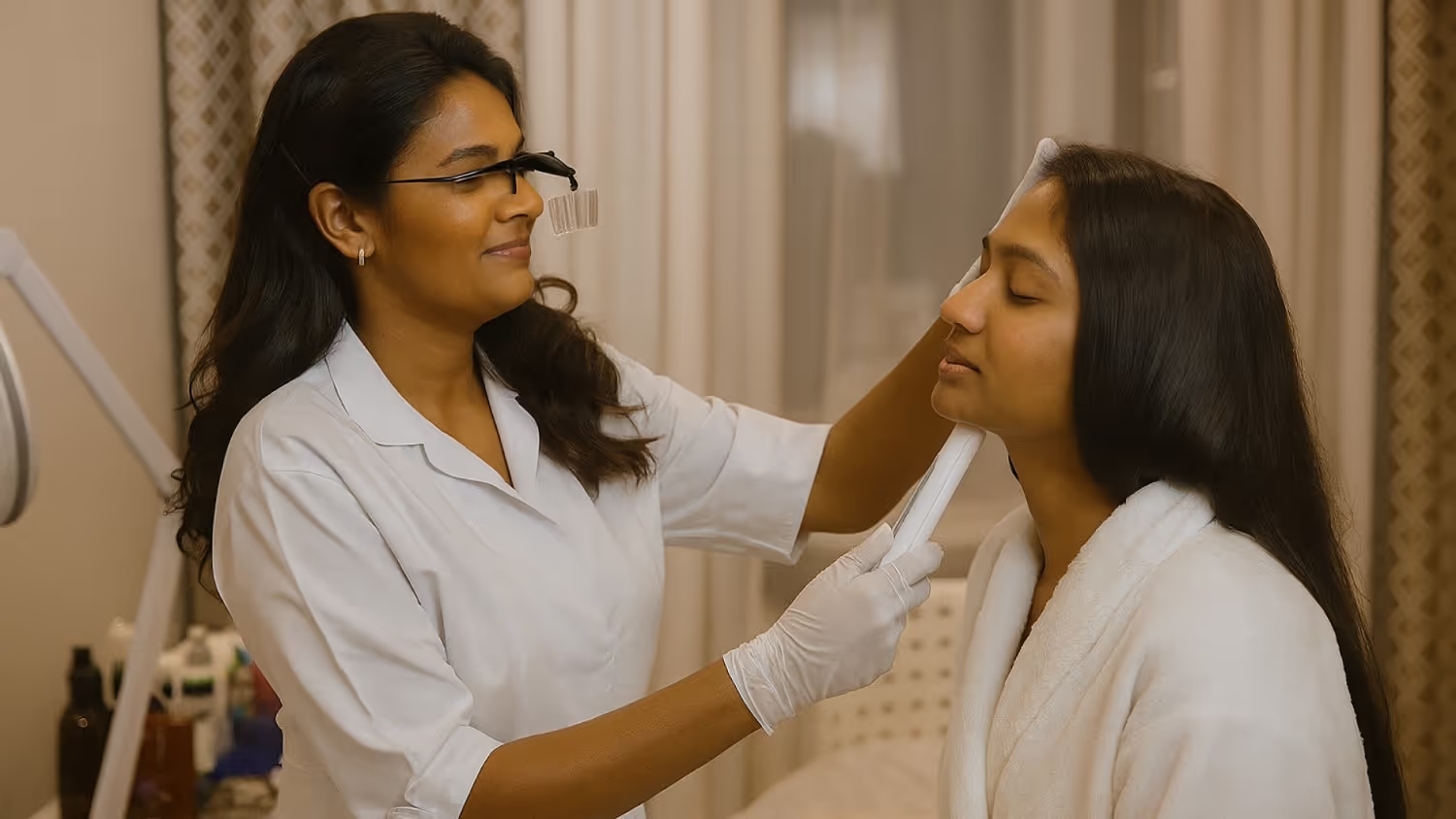
Choosing a qualified dermatologist is essential for safe and effective wrinkle reduction. Look for board certification, formal dermatology training, and experience with your skin type. These credentials help ensure that your treatment is medically sound and tailored to your individual needs.
During your consultation, ask about the doctor's experience, view before-and-after photos, and discuss the treatment plan in detail. Understand the expected outcomes, the number of sessions, recovery time, and associated costs. Be cautious of vague credentials, rushed consultations, or overly promising results. A trustworthy dermatologist will prioritise your safety and provide care based on evidence and ethical standards.
If you're seeking expert anti-ageing solutions, Velantis Dermatology offers a science-driven, patient-first approach. Their team of board-certified dermatologist provides in-depth consultations and advanced treatments tailored to your unique skin concerns.
At Velantis Dermatology, you can expect:
- Evidence-based anti-ageing solutions, including Botox, dermal fillers, chemical peels, microneedling, and laser therapies
- Customised treatment plans based on skin analysis, age, lifestyle, and desired outcomes
- Comprehensive skincare guidance that integrates professional procedures with at-home routines
- Cutting-edge technology for precise and effective wrinkle reduction with minimal downtime
- Ethical, transparent consultations with realistic timelines and outcome expectations
- Before-and-after documentation to help set clear, achievable goals
Whether you're beginning your anti-ageing journey or exploring next-level rejuvenation options, Velantis Dermatology combines medical precision with a deep understanding of skin health for safe, long-lasting results.
Conclusion
Learning how to reduce wrinkles effectively requires more than quick fixes. Successful treatment blends evidence-based medical procedures with healthy lifestyle habits and a consistent skincare routine. This comprehensive approach addresses multiple factors that contribute to facial ageing and supports natural, lasting results.
Modern dermatology offers a wide range of proven solutions, including prescription retinoids, chemical peels, advanced laser therapies, and injectable fillers. Each option has unique benefits that should be carefully evaluated with an experienced dermatologist who can customise a plan to your skin type and goals. Gradual improvements over time are typical, allowing your skin to heal and transform in the most natural-looking way.
Ultimately, maintaining smoother, healthier skin depends on daily sun protection and adopting supportive habits, such as a balanced diet, sufficient sleep, and effective stress management.
If you're ready to explore personalised treatments and start your journey to younger-looking skin, connect with Specialists at Velantis Dermatology for expert guidance and safe, effective care.
FAQS
Q1. Where can I find the best dermatologist for wrinkle treatments in Chennai?
A1. Velantis offers expert wrinkle treatments in Chennai, led by experienced dermatologists. Other options include Apollo Hospitals, Dermis Skin & Hair Clinic (Adyar), and DC Clinic (Velachery) for comprehensive wrinkle care.
Q2. How does Chennai's sun affect my skin and cause wrinkles?
A2. Chennai's intense UV rays (especially 10 AM-2 PM) break down collagen faster, causing early wrinkles and fine lines. The high humidity and pollution exacerbate sun damage.
Q3. What wrinkle treatments are available at dermatology clinics in Chennai?
A3. Chennai dermatologists offer Botox, dermal fillers, laser treatments, skin tightening, and medical-grade skincare. Many clinics also offer cryotherapy for the repair of sun damage.
Q4. Are retinoid creams effective for wrinkles in Chennai's climate?
A4. Yes. Retinoids boost collagen and smooth fine lines. In Chennai's humid weather, start with low concentrations and use only at night to avoid sun sensitivity.
Q5. What foods should I eat to maintain youthful skin?
A5. Eat vitamin C fruits (citrus, berries), leafy greens, nuts, and fish like salmon. Drink coconut water for hydration. These help protect against UV damage and boost collagen production.
Q6. Does staying hydrated help reduce wrinkles in Chennai's humid weather?
A6. Yes. Chennai's heat increases water loss. Drink plenty of water and use hyaluronic acid moisturisers to keep skin plump and reduce fine lines.
Q7. How do lifestyle habits affect wrinkles in Chennai's environment?
A7. Smoking and pollution accelerate wrinkle formation. Get 7-8 hours of sleep in an AC, manage stress, and avoid smoking to protect your skin from Chennai's harsh environment.
Q8. When should I consult a dermatologist in Chennai for wrinkle treatment?
A8. See a dermatologist if you notice sun damage, persistent fine lines, or uneven skin tone. Start preventive treatments in your late 20s due to Chennai's intense sun exposure.
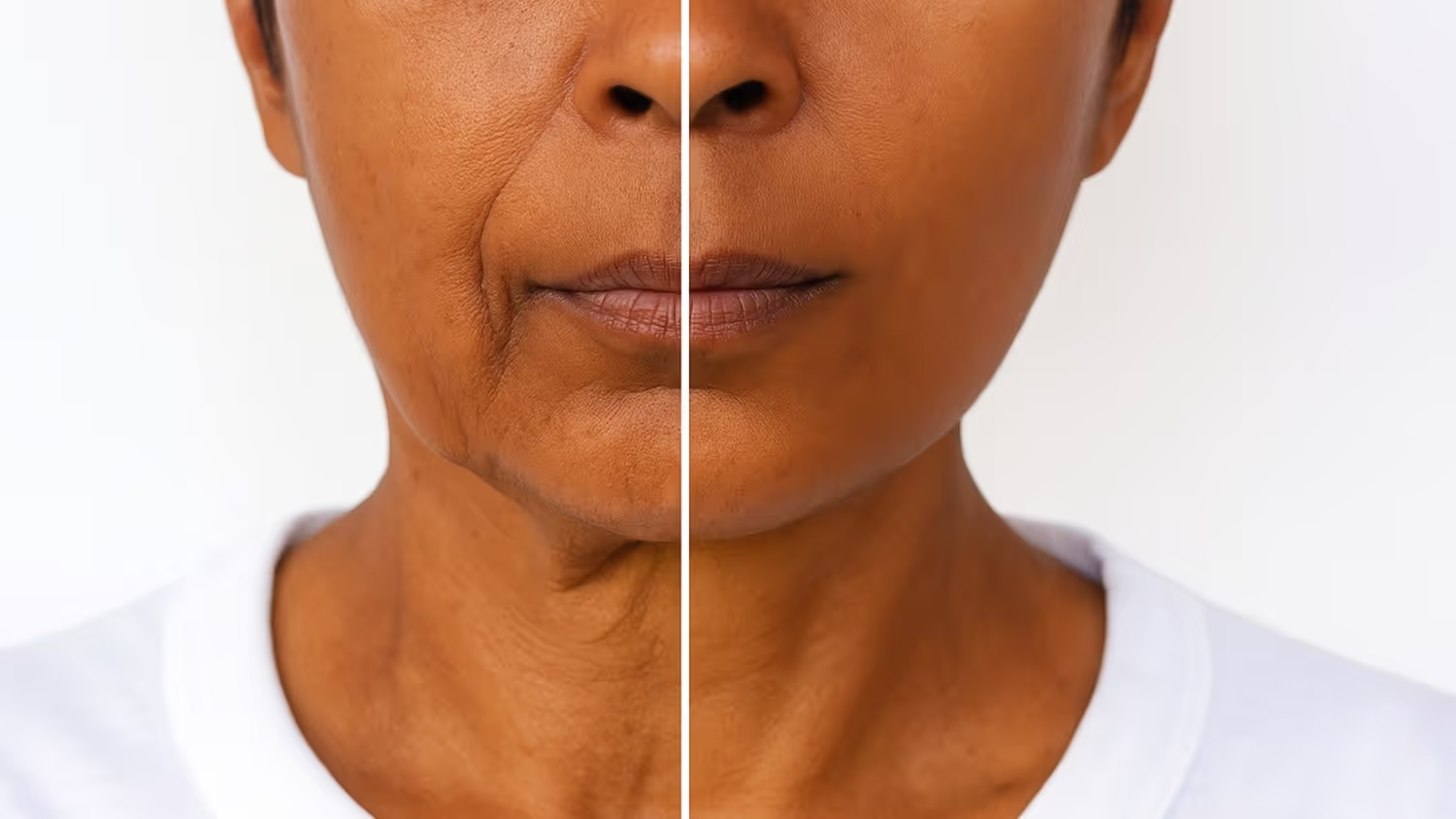

.png)
